Fine motor skills are crucial for performing everyday tasks and are integral to a child’s overall development. These skills involve the precise movements of the small muscles in the hands, fingers, and wrists, enabling activities such as writing, cutting with scissors, buttoning clothing, and manipulating small objects. In Montessori education, the development of fine motor skills is emphasized across all age groups, not just within the Nido environment for infants.
Montessori classrooms are rich with activities designed to enhance fine motor development. For children in Primary environments (ages 3-6), practical life activities such as pouring, spooning, and tweezing offer opportunities to practice coordination and control. These tasks not only engage children in meaningful work but also prepare their hands for writing and other academic challenges. Similarly, Sensorial materials like the Metal Insets provide practice in tracing shapes, refining pencil grip, and control.
In Elementary classrooms (ages 6-12), fine motor skills are further developed through more complex practical life tasks, science experiments requiring precise measurements, and art projects involving detailed work with various tools and mediums. The emphasis on hands-on learning allows children to continuously refine these essential skills in contextually meaningful ways.
The Montessori approach recognizes the interconnectedness of fine motor skills with cognitive development, independence, and self-expression. By providing an environment that offers varied and progressively challenging activities, Montessori education supports the holistic development of children, ensuring they have the fine motor skills necessary for academic success and practical life.

